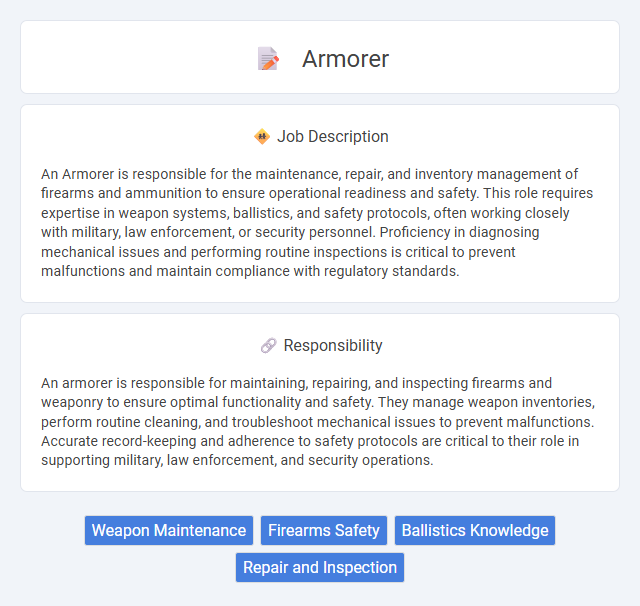
An Armorer is responsible for the maintenance, repair, and inventory management of firearms and ammunition to ensure operational readiness and safety. This role requires expertise in weapon systems, ballistics, and safety protocols, often working closely with military, law enforcement, or security personnel. Proficiency in diagnosing mechanical issues and performing routine inspections is critical to prevent malfunctions and maintain compliance with regulatory standards.
People with strong attention to detail and a steady hand are probably most suited for the role of an armorer, as the job requires precise weapon maintenance and repair. Individuals prone to distraction or discomfort with firearms may find the responsibilities challenging or unsuitable. Physical stamina combined with patience is likely important, given the need to handle various weapon types under strict safety protocols.
Qualification
Armorer positions typically require a high school diploma or equivalent, with advanced knowledge of firearms, ammunition, and weapon maintenance. Candidates must demonstrate strong mechanical skills, attention to detail, and the ability to follow strict safety protocols. Certification from recognized institutions, such as the American Board for Certification in Homeland Security or military training, enhances job prospects in this field.
Responsibility
An armorer is responsible for maintaining, repairing, and inspecting firearms and weaponry to ensure optimal functionality and safety. They manage weapon inventories, perform routine cleaning, and troubleshoot mechanical issues to prevent malfunctions. Accurate record-keeping and adherence to safety protocols are critical to their role in supporting military, law enforcement, and security operations.
Benefit
An Armorer likely benefits from a specialized skill set that enhances job security in military and law enforcement sectors. The probability of competitive salaries and additional allowances increases due to the technical expertise required. Access to professional development and hands-on experience with advanced weaponry usually improves career advancement opportunities.
Challenge
The armorer job likely involves facing challenges related to maintaining and repairing a wide variety of weapons and equipment under strict safety standards. There is a high probability that precision and attention to detail are crucial to prevent malfunctions or accidents. Frequent troubleshooting of complex mechanical systems may require continuous learning and adaptation to new technology.
Career Advancement
An armorer career offers specialized skills in maintaining and repairing firearms and weaponry, crucial in military, law enforcement, and private security sectors. Advancement opportunities include promotions to supervisory roles, such as armory supervisor or weapons instructor, as well as transitioning into forensic weapons examination or defense contracting. Continuous training in emerging weapon technologies and certification upgrades significantly enhance job prospects and earning potential.
Key Terms
Weapon Maintenance
Armorer specialists ensure the optimal functionality and safety of firearms through meticulous weapon maintenance, including cleaning, inspection, repair, and calibration. Their expertise in diagnosing mechanical issues and replacing worn or defective components extends the lifespan of military and law enforcement weaponry. Proficient use of precision tools and adherence to strict safety protocols prevent malfunctions and maintain operational readiness in high-stakes environments.
Firearms Safety
Armormers play a critical role in ensuring firearms safety by meticulously inspecting, maintaining, and repairing weapons to prevent malfunctions and accidents. They apply expert knowledge of firearm mechanics and safety protocols to identify potential hazards and enforce strict adherence to safety standards. Their work enhances operational effectiveness and safeguards users by minimizing the risk of firearm-related injuries or failures.
Ballistics Knowledge
An armorer with expertise in ballistics knowledge is responsible for understanding the behavior and impact of various ammunition types and firearms to ensure proper maintenance, safety, and performance of weapons. They analyze ballistic data to recommend appropriate firearm modifications, optimize operational efficiency, and enhance user safety in both civilian and military applications. Proficiency in external, internal, and terminal ballistics enables the armorer to provide critical support in weapon system diagnostics and forensic investigations.
Repair and Inspection
Armormers specialize in the repair and inspection of firearms and protective gear, ensuring optimal functionality and safety. They meticulously assess weapons for wear, damage, and malfunctions, performing detailed maintenance and precise adjustments to restore operational integrity. Regular inspections by armormers significantly reduce equipment failure, enhancing reliability in both military and law enforcement applications.
 kuljobs.com
kuljobs.com